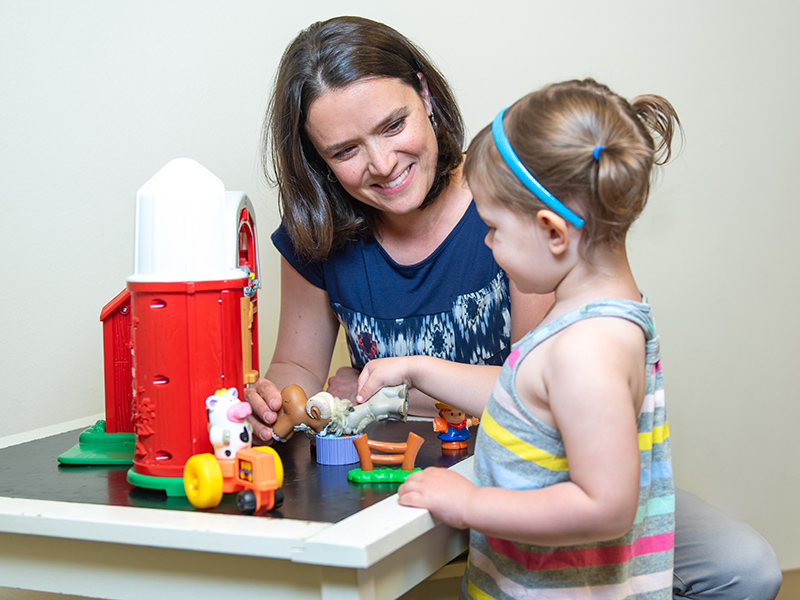Pediatric Services
Our pediatric speech therapists love working with children and help them meet their communication potential while having fun!
We’re here to help, for all stages of life.
Our pediatric Speech-Language Pathologists (SLPs) love working with children. These therapists evaluate and treat communication challenges, including expressive and receptive language disorders, speech disorders, fluency disorders, and social skills. Speech Therapists address other concerns such as feeding aversion, chewing, swallowing, auditory processing, cognitive deficits, and voice disorders. They can also identify the need for augmentative and alternative communication (AAC) and can help find an appropriate means for communication.

Many disorders that we treat are developmental (meaning present at birth or present as the child ages), but we also treat acquired disorders (meaning an event caused the disorder). Some insurance companies will not cover developmental disorders, so we strongly recommend you contact your insurance company regarding coverage.
All
Whatever your child’s need, our purpose is to ensure that they meet their communication potential while having fun!

Thanks for voting us Bend’s best pediatric Speech Therapist!
Winner of the Bend Nest parenting magazine 2023 Best Of The Nest.
Pediatric Speech Therapy Services
Speech Disorders
When children are learning to speak, there is sometimes a breakdown or delay in the acquisition of some consonant and vowel sounds. This can lead to difficulty when a child is trying to get her needs met by an adult. Speech therapists work to teach children how to produce speech sounds in isolation first and then in all positions of words so that they can eventually use these speech sounds without any assistance.
Fluency Disorders
Some children experience challenges speaking fluently (e.g., stuttering is a form of disfluency). Speech therapists work with these children and their parents on techniques to support more fluent speech.
Language Disorders
Sometimes children have trouble understanding others (receptive language), or sharing thoughts, ideas, and feelings (expressive language). Language disorders may be spoken or written and may involve the form (phonology, morphology, syntax), content (semantics), and/or use (pragmatics) of language in functional and socially appropriate ways. Speech therapists can determine the specific area of breakdown and then teach the specific skills or concepts in a way that is specific to that child’s needs and learning style.
Augmentative and Alternative Communication (AAC)
This describes the communication systems used by individuals with severe expressive and/or language comprehension disorders, such as autism spectrum disorder or progressive neurological disorders. Speech therapists can determine the most effective and appropriate communication system for an individual and then teach them how to use that system to communicate with others.
Social Communication Disorders
Some children find it challenging to communicate socially using verbal and nonverbal communication. These disorders may include problems (a) communicating for social purposes (e.g., greeting, commenting, asking questions), (b) talking in different ways to suit the listener and setting, and (c) following rules for conversation and story-telling. Individuals with autism spectrum disorder experience social communication problems. Social communication disorders are also found in individuals with other conditions, such as traumatic brain injury. Speech-language pathologists help individuals with these challenges learn to navigate social situations in a controlled environment and then generalize these skills to social interactions in everyday life.
Cognitive-Communication Disorders
Some children experience difficulty organizing thoughts, paying attention, remembering, planning, and/or problem-solving. In children, these disorders usually happen as a result of a traumatic brain injury, although they can be congenital. Speech-language pathologists work with individuals experiencing these challenges on strategies to maintain better organization and generate strategies to improve their problem-solving skills.
Voice Disorders
While voice disorders typically impact adults, children can also experience these challenges. Voice disorders can impact voice quality, pitch, loudness and breathing. Speech therapists work with these children and their families to improve the way they use their voice and eliminate or reduce any behaviors that may be contributing to their symptoms.
Breathing Problems/Vocal Cord Dysfunction
These challenges fall under the umbrella of voice disorders due to the involvement of the vocal cords in a condition called vocal cord dysfunction (VCD). An individual experiencing VCD may have difficulty breathing (especially inhaling). This can occur as the result of an exposure to an irritant or from exertion with physical activity. VCD episodes can be frightening and sometimes lead to a child avoiding play or exercise for fear of not breathing well. These individuals are often referred to speech therapy after an evaluation with an asthma and allergy specialist or a laryngologist. Speech therapists can help to diagnose the condition and then train the child on strategies to reduce or eliminate the symptoms.
Feeding and swallowing disorders (dysphagia) and myofunctional disorders
People of all ages may experience challenges eating or drinking. This can be for many different reasons in children including but not limited to, problems with latch at the breast, tongue-tie, cleft lip and/or palate, hyperactive gag, low or high tone and weakness or incoordination that impact sucking, swallowing and breathing or chewing. Speech therapists work with these babies and children as well as their families to determine the safest way to meet caloric and hydration needs and to enjoy mealtimes. Myofunctional therapy is an exercise-based swallowing therapy for the muscles of the mouth, tongue and face. The exercises are designed specifically to train proper breathing, speaking, chewing and swallowing.
Getting Started is Easy
Questions?
We're here to help. Feel free to Contact Us with any questions you may have.
Book Appointment
When you're ready to book your first appointment, give us a call at (541) 604-8255.
Your First Visit
Fill out our new client paperwork and bring it with you on your first appointment.
